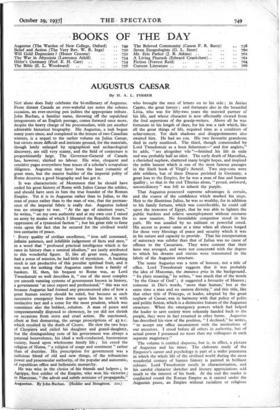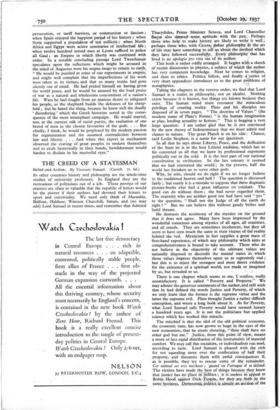BOOKS OF THE DAY
Augustus (The Warden of New College, Oxford) 749 Belief and Action (The Very Rev. W. R. Inge) 750 Will Gold Depreciate ? (Honor Croome) 752 The War in Abyssinia (Lawrence Athill) 754 Hitler's Germany (Prof. E. H. Carr) .. 754 The Bible (E. L. Woodward) .. 756 The Beloved Community (Canon F. R. Barry)
753
Seven Escapologists (G. L. Steer) .. 760 Mr. Eric Parker (J. B. Atkins) .. .. 762 A Living Pharaoh (Edward Crankshaw).. 762 Fiction (Forrest Reid) .. .. 764 Current Literature .. .. 766
AUGUSTUS CAESAR
By H. A. L. FISHER NOT alone does Italy celebrate the bi-millenary of Augustus. From distant Canada an ever-wakeful eye notes the solemn occasion, an ever-moving pen indites the appropriate tribute. John Buchan, a familiar name, throwing off the sepulchral integuments of an English peerage, comes forward once more, despite the heavy charge of his proconsulate, with yet another admirable historical biography. His Augustus, a task begun many years since, and completed in the leisure of two Canadian winters, is a sequel to the earlier volume on Julius Caesar, but covers more difficult and intricate ground, for the materials, though lately enlarged by epigraphical and archaeological discovery, are still very scanty, and the field of conjecture is proportionately large. The Governor-General of Canada has, however, shirked no labour. His wise, eloquent and sensitive pages everywhere bear traces of a scholar's scrupulous diligence. Augustus may have been the least romantic of great men, but the master builder of the imperial polity of Rome deserves a good biography and has got it.
It was characteristic of Mommsen that he should have ended his great history of Rome. with Julius Caesar the soldier, and should have seen in him the true founder of the Roman Empire. Yet it is to Augustus rather than to Julius, to the man of peace rather than to the man of war, that the perman- ence of the imperial fabric is really due. Augustus indeed was no stranger to war. " At the age of nineteen years," he writes, " on my own authority and at my own cost I raised an army by means of which I liberated the Republic from the oppression of a tyrannical faction " ; but his great title to fame rests upon the fact that he secured for the civilised world two centuries of peace.
Every quality of civilian excellence, " iron self command, infinite patience, and infallible judgement of facts and men," in a word that " profound practical intelligence which is far rarer in history than a seminal idealism," are justly attributed to this wonderful figure. If, like all great men, Augustus had a sense of mission, he had little of mysticism. A banking stock is not productive of this peculiar spiritual fruit, and it was • not for nothing that Augustus came from a family of bankers. If, then, his bequest to Rome was, as Lord Tweedsmuir so well describes it, " one of the most complex yet smooth running systems of government known in history, a government ' at once expert and professional,' " this was not because Augustus had formed any preconceived idea of how a great human society should be ruled, but because as each successive emergency bore down upon him he met it with instinctive tact and a sense for the most prudent, which was sometimes also the boldest, ,solution. A man of peace and temperamentally disposed to clemency, he yet did not shrink on occasions from stern and cruel action. He sanctioned, albeit at first demurring, the savage proscriptions of 43 B.C. which resulted in the death of Cicero. He slew the two boys of Cleopatra and exiled his daughter and grand-daughter, but the distinguishing note of his government was always a paternal benevolence, his ideal a well-conducted, harmonious society, based upon wholesome family life ; his creed the religion of Numa, " a religion of usage and sentiment " rather than of doctrine. His prescription for government was a judicious blend of old and new things, of the tribunician Power and proconsular authority, of the popular and autocratic, of republican office and hellenistic monarchy.
He was wise in the choice of his friends and helpers ;_ in Agrippa, first soldier of the Empire, who won his victories ; in Maecenas, " the adroit and subtle minister o f propaganda,"
Augustus. By John Buchan. (Hodder and StOughton: 2Is.)
who brought the men of letters on to his side ; in Ateius Capito, the great lawyer ; and fortunate also in the beautiful Livia, who was for fifty-two years the married partner of his life, and whose character is now effectually cleared from the foul aspersions of the gossip-writers. Above all he was fortunate in his length of days, for his was a task which, like all the great things of life, required time as a condition of achievement. Yet dark shadows and disappointments also awaited him. He had no son. His two favourite grandsons died in early manhood. The third, though commended by Lord Tweedsmuir as a keen fisherman—" and few anglers," he adds, "are altogether vile "—finished his life in exile and was probably half an idiot. The early death of Marcellus, a cherished nephew, shattered many bright hopes, and inspired the noble lament which is one of the most famous passages in the Sixth book of Virgil's Aeneid. Two step-sons were able soldiers, but of these Drusus perished in Germany, a great loss to the Empire, for he was a man of fine and human quality ; so that in the end Tiberius alone, " proud, awkward, unconciliatory " was left to inherit the purple.
That Augustus possessed supreme advantages is certain, and the source of the confidence which marked his steps. Heir to the illustrious Julius, he was so wealthy, for in addition to his family fortune, which was considerable, he could call upon the treasures of Egypt, that he was able to lighten the public burdens and relieve unemployment without recourse to new taxation. No formidable competitor stood in his path. He was assailed by no militant or powerful creed. His ascent to power came at a time when all classes longed for those very blessings of peace and security which it was in his nature and capacity to provide. That his interpretation of autocracy was subtler than that of Julius was no cause of offence to the Caesarians. They were content that their hero was avenged, and were not concerned with the degree to which his dreams and visions were transmuted in the fabric of the Augustan structure.
The name Augustus was a term of honour, not a title of office. Lord Tweedsmuir suggests that it was probably the idea of Maecenas, the eminence grise in the background. " Its plain meaning," he writes, " was much that of the words ' by the Grace of God' ; it suggested a favourite of Heaven ; someone in Dio's words, ' more than human,' but at the same time a man and no eastern divinity," and this title, like that other title of Princeps, or leader, adopted by the great nephew of Caesar, was in harmony with that policy of polite and politic fiction, which is a distinctive feature of the Augustan structure. When the emergency powers which had helped the leader to save society were solemnly handed back to the people, they were in fact resumed in other forms. Augustus has described his view of the position, " I declined," he writes, " to accept any office inconsistent with the institutions of our ancestors. I stood before all others in authority, but of actual power I possessed no more than my colleagues in each separate magistracy."
The volume is entitled Augustus, but is, in effect, a picture of Augustus and his times. The elaborate study of the Emperor's career and psychology is part of a wider panorama in which the whole life of the civilised world duiing the most wonderful century of human history is painted in brilliant colours. Lord Tweedsmuir excels in characterisation, and his careful character sketches and literary appreciations add much to the interest of his book. At the end the reader is condticted round the Roman Empire as it existed under the Augustan peace, an Empire without racialism or religious
persecution, or tariff barriers, or communism or fascism ; when Spain enjoyed the happiest period of her history ; when Syria supported a population or ten millions ; when North Africa and Egypt were active seminaries of intellectual life ; when twelve hundred armed men at Lyons sufficed to police all Gaul ; an Empire in which liberty was combined with order. In a notable concluding passage Lord Tweedsmuir speculates upon the reflections which might be aroused in the mind of Augustus were his magna imago to return to earth. " He would be puzzled at some of our experiments in empire, and might well complain that the imperfections of his work were taken as its virtues, and that so many truths had gone silently out of mind. He had prided himself on having given the world peace, and he would be amazed by the loud praise of war as a natural and wholesome concomitant of a nation's life. Wars he had fought from an anxious desire to safeguard his people, as the shepherd builds the defences of his sheep-- fold ; but he hated the thing, because he knew well the deadly ' disordering' which the Greek historian noted as the conse- quende of the most triumphant campaign. He would marvel, too, at the current talk of racial purity, the exaltation of one breed of men as the chosen favourites of the gods. . . . But chiefly, I think, he would be perplexed by the modern passion for regimentation and the assumed contradiction between law and liberty. . . . And when this expert in meehanisth observed the craving of great peoples to enslave themselves and. to exult hysterically in their bonds, bewilderment would harden•to disdain in his masterful eyes."



























































 Previous page
Previous page